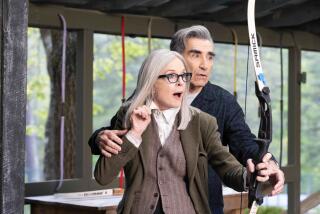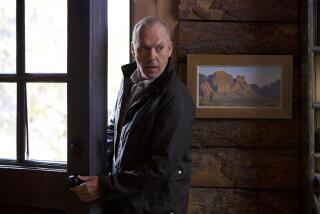MOVIE REVIEW : A ‘GUNG HO’ TALE WITH SHORTCOMINGS
- Share via
When veteran screenwriter Edwin Blum watched a “60 Minutes” segment on the opening of a Nissan plant in Smyrna, Tenn., he saw in it the possibility for a comedy centering on an East-West culture clash.
From this idea blossomed Ron Howard’s “Gung Ho” (citywide), which has all the vitality but little of the sensitivity of his hits “Splash” and “Cocoon.”
When the auto factory in the fictional Pennsylvania town of Hadleyville folds, plant foreman Michael Keaton is delegated by his co-workers (virtually the entire community) to fly off to Japan to find an auto company willing to move in and save the town. So disastrously boorish is Keaton that when he returns, even he is stunned to realize that his proposal has been accepted.
From the moment the Japanese contingent arrives in Hadleyville, it’s clear that the marriage of Japanese management and American labor is going to be stormy. What’s this nonsense about having to start the day with exercises, complain the good ole boys on the assembly line (not a woman among them, by the way). But as tension escalates, Keaton, who’s been appointed liaison between the new owners and his worker-pals, is increasingly thrown together with his opposite number (Gedde Watanabe), a young junior executive whose career is on the line. They both realize they’ve got to work together if the venture is to survive its trial run.
Where writers Lowell Ganz and Babaloo Mandel, working from a story they wrote with Blum, are on surest ground is with the film’s serious underpinnings. Many Japanese are beginning to question the validity of the samurai spirit that lives on in Japanese corporations, demanding total loyalty and dedication above all else, even family life. On the other hand, Americans can learn much from the Japanese example of pride in craftsmanship. In one of the film’s many grandstanding moments, Watanabe is dead right when he tells his workers that Americans have become selfish and have lost their team spirit.
Ever since his terrific debut in “Night Shift,” Michael Keaton’s comic flair has involved a thoroughly uninhibited, blundering klutziness plus his delicious way with a double-take. In “Gung Ho” he seems far smarter than his unthinking, insensitive character, although Keaton the actor manages to be likable, even when his headstrong foreman isn’t. The same applies to Watanabe, even when what he’s asked to do in his adoption of American ways is more demeaning than funny. George Wendt is the dimmest, most easily threatened of Keaton’s pals, a good guy under a hostile surface. Soh Yamamura, one of the most distinguished stars of the Japanese cinema, is amusingly stern as the auto company president.
“Gung Ho” goes after that ever-so-elusive Capra-esque spirit of communal triumph over adversity, but both sides too often verge on stereotypes for this to pay off as richly as it should. If anything, the Americans fare less well than the Japanese; not all the citizens of towns like Hadleyville are unsophisticated, uneducated laborers--and not all those laborers are as slow on the uptake as “Gung Ho” would suggest.
Despite these shortcomings, “Gung Ho” is well structured, a handsome production designed by James Schoppe and beautifully shot by Don Peterman, not only in and around Pittsburgh but also at an auto factory in Buenos Aires. Ron Howard usually manages to bring an infectious spirit of fun to his films; this time, “Gung Ho” (rated PG-13 for some strong language) needs all that he can spare.
More to Read
Only good movies
Get the Indie Focus newsletter, Mark Olsen's weekly guide to the world of cinema.
You may occasionally receive promotional content from the Los Angeles Times.










